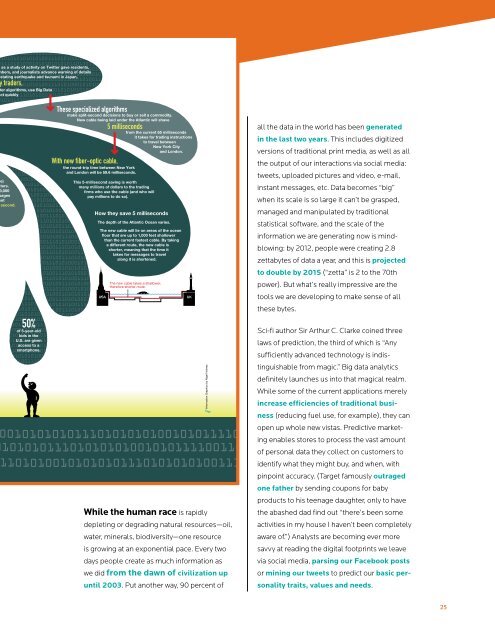6J3m2WVwK
6J3m2WVwK
6J3m2WVwK
You also want an ePaper? Increase the reach of your titles
YUMPU automatically turns print PDFs into web optimized ePapers that Google loves.
all the data in the world has been generated<br />
in the last two years. This includes digitized<br />
versions of traditional print media, as well as all<br />
the output of our interactions via social media:<br />
tweets, uploaded pictures and video, e-mail,<br />
instant messages, etc. Data becomes “big”<br />
when its scale is so large it can’t be grasped,<br />
managed and manipulated by traditional<br />
statistical software, and the scale of the<br />
information we are generating now is mindblowing:<br />
by 2012, people were creating 2.8<br />
zettabytes of data a year, and this is projected<br />
to double by 2015 (“zetta” is 2 to the 70th<br />
power). But what’s really impressive are the<br />
tools we are developing to make sense of all<br />
these bytes.<br />
While the human race is rapidly<br />
depleting or degrading natural resources—oil,<br />
water, minerals, biodiversity—one resource<br />
is growing at an exponential pace. Every two<br />
days people create as much information as<br />
we did from the dawn of civilization up<br />
until 2003. Put another way, 90 percent of<br />
Sci-fi author Sir Arthur C. Clarke coined three<br />
laws of prediction, the third of which is “Any<br />
sufficiently advanced technology is indistinguishable<br />
from magic.” Big data analytics<br />
definitely launches us into that magical realm.<br />
While some of the current applications merely<br />
increase efficiencies of traditional business<br />
(reducing fuel use, for example), they can<br />
open up whole new vistas. Predictive marketing<br />
enables stores to process the vast amount<br />
of personal data they collect on customers to<br />
identify what they might buy, and when, with<br />
pinpoint accuracy. (Target famously outraged<br />
one father by sending coupons for baby<br />
products to his teenage daughter, only to have<br />
the abashed dad find out “there’s been some<br />
activities in my house I haven’t been completely<br />
aware of.”) Analysts are becoming ever more<br />
savvy at reading the digital footprints we leave<br />
via social media, parsing our Facebook posts<br />
or mining our tweets to predict our basic personality<br />
traits, values and needs.<br />
25



